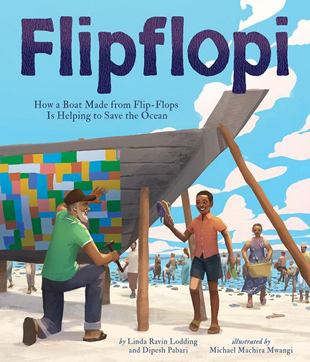Many people, coming upon a beach covered in plastic trash, either shake their heads sadly and walk away or pick up a few pieces and feel they have done their part for now to stem the tide of pollution. In this book, young Juma and his elder friend Babu Ali, see what looks like "a million different colored fish have washed up on the beach." Realizing that they're seeing flip-flops, they take a novel approach. Juma notices that one of the floating flip-flops looks like a boat, and Babu Ali is a master boat builder. Together, they hatch a plan to collect the beached plastics (not only flip-flops) and make them into a sailing boat.
What's remarkable is not only their ingenuity, but also their confidence that others can be encouraged to help. At first their neighbors laugh about them building a boat out of trash. But when Juma and Babu Ali realize that there's so much trash — and so many pieces of plastic needed to build their boat — that they can't manage on their own, Juma goes to friends one-by-one to ask them to help. Word spreads, and pretty soon dozens of people are diligently collecting and marveling over their "catch."
You can see the results at the Flipflopi website and in the back of the book, which tells the true story upon which this tale is based and gives jaw-dropping facts. For instance, the recycled-plastic boat structure, called the Flipfloi Ndogo, weighs seven metric tons and is covered in sheets made from 30,000 discarded flip-flops.
The book also gives tips — suited to four-to-eight year old readers — about reducing plastic pollution. These include packing sandwiches and snacks in cloth bags rather than plastic ones, recycling so that plastic waste won't wind up in waterways, and making plastic trash into something new and useful.
Award-winning author Linda Ravin Lodding worked together with Kenyan eco-leader, educator, and plastic-waste innovator Dipesh Pabari — one of the founders of the Flipflopi Project — to write this book. Michael Machira Mwangi, a self-taught Kenyan digital artist, makes the illustrations realistic and engaging so that even a child who can't yet read can follow the story line.
The most exciting part of the Flipflopi book and project is that the boat designed from plastic trash is docking at ports around the world to teach that we need to get rid of single-use plastics altogether. If that sounds like too big a goal to which to aspire, the authors leaves us with a Swahili saying, "Kila kitu inawezekana!" Everything is possible!
